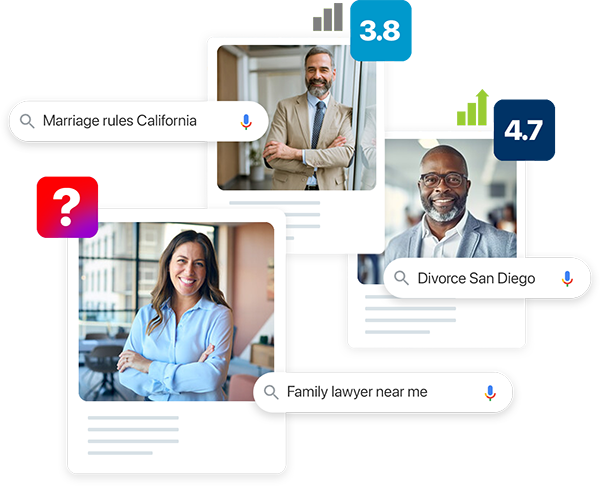Google’s latest core update, launched in the last few days, is creating significant buzz among SEO and content professionals.
Considering the Helpful Content Update in August has caused months of rankings volatility and frustration as results have fluctuated with no apparent reason (we’ve seen clients’ rankings go from top 3, to unranked, which means they aren’t even in the top 100, back to top 3, within a few weeks – this is unprecedented), we are cautiously watching and waiting to assess what this new update will impact.
This update, like others before it, is (apparently) focused on enhancing search quality by prioritizing genuinely useful content while down-ranking pages that appear solely crafted to rank on search engines. We hope that it will also start to stabilize the wild swings in rankings we’ve had to endure for the last few months.
Here’s a breakdown of what the update is likely to mean for legal professionals, and some recommendations on how your firm can adapt.
Key Questions Covered
- What is the November 2024 Google Core Update?
- How will this update impact law firm websites?
- What strategies can law firms use to maintain their rankings?
- How can legal websites ensure content remains relevant and valuable?
1. What Is the November 2024 Google Core Update?
Google core updates are broad adjustments to its search algorithm intended to improve search quality. These updates do not target specific sites but rather refine Google’s overall approach to ranking content. This November’s update aims to prioritize:
- User-centered content: Pages that answer questions and provide real value to users.
- Genuine expertise: Content that displays real subject-matter expertise, especially in industries like law, where authority and trustworthiness are essential.
2. Why This Update Matters for Law Firms
Law firm websites often compete on expertise, trustworthiness, and authority, making them well-suited for Google’s latest emphasis on quality. This update could offer firms a competitive edge if they focus on content that aligns with Google’s goals, specifically:
- Providing accurate legal insights and advice that genuinely inform clients.
- Showcasing experience and expertise that indicates your authority in the subject.
- Avoiding generic or shallow content that doesn’t offer substantial information or perspectives.
3. Expecting Fluctuations During the Rollout
Core updates often lead to ranking volatility, so firms should expect potential shifts in search engine results over the next couple of weeks. This period of change is normal, and positions often stabilize after the update fully rolls out. Be prepared for fluctuations and keep a close eye on your site’s metrics.
What to Watch:
- Keyword Rankings: Track core legal keywords and practice area terms in Google Search Console (but bear in mind keywords are just one measure, and increasingly we care more about entity-based SEO)
- Traffic Sources: Monitor changes in organic traffic to identify if specific pages are losing visibility.

Find out where you stand with a local keyword report.
4. Strategies for Maintaining or Improving Rankings
Focus on People-First Content
Content that authentically addresses client concerns and answers specific legal questions will be increasingly valuable (particularly as many people use questions to search, and voice-activated search). To enhance the user experience:
- Directly address common legal questions that potential clients search for.
- Use clear, jargon-free language to make complex legal topics accessible.
Update Older Content
Revisit existing content, especially pages covering practice areas or commonly searched legal topics. Updating articles with fresh insights or statistics can make a significant difference in ranking. Key questions to ask:
- Does the page still offer unique insights?
- Has recent legislation or court decisions affected the information?
Emphasize Expertise, Authority, and Trustworthiness (E-A-T)
Law firms are already positioned as experts in their field, but Google’s update underscores the importance of credibility:
- Cite reputable sources and legal precedents.
- Ensure your firm’s experience and credentials are clear on every page.
- Build out attorney profiles with detailed backgrounds to reinforce authority.
5. Avoiding Pitfalls
- Don’t rely on AI Content: While AI can assist with drafting, Google is increasingly adept at identifying overly automated or shallow content. Prioritize substance and utility over content volume. NOTE – LegalRev doesn’t use AI to write any of our client blogs or website content.
- Stay Relevant to User Intent: Keep your content aligned with what clients actually want. Google’s latest updates reward pages that match searcher intent closely.
6. Monitor Performance and Adapt
While the update is rolling out, tracking key performance indicators is important, but can require nerves of steel if you see big fluctuations. Tools like Google Analytics and Search Console can reveal trends over the next two weeks. Focus on:
- Changes in organic traffic: Assess which pages are seeing drops or gains.
- Keyword performance: If specific keywords have declined, consider revisiting those pages to ensure they provide user value.
Final Thoughts: Quality and Consistency Win in the Long Term
Google’s updates can feel unpredictable, but maintaining a commitment to people-first content, demonstrating your legal expertise, and adapting to changes will position your firm for success. Remember, SEO is a marathon, not a sprint, and sustained quality is the best way to secure long-term visibility.
If you want to talk to us about how LegalRev can help you optimize your site and give it a strong foundation to withstand any shifts in SEO, please feel free to reach out to [email protected], or book a meeting here.




